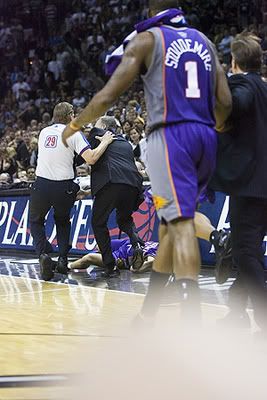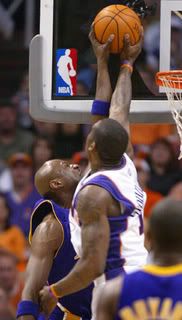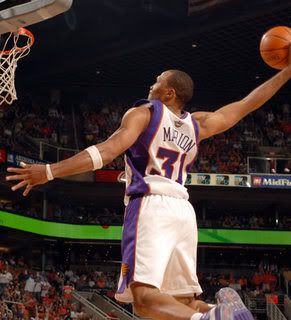I have declined to comment on the "racial bias among NBA referees" story for good reason. It is the worst kind of research in that the conclusions were drawn based almost purely on speculation (they didn't know which official called which foul on which player, or whether those fouls were legitimately called). To their credit, the researches did ask the league for more comprehensive statistics, but David Sterned declined. Instead, the league performed its own analysis based on those "confidential" files (presumably to protect the referees' privacy or whatever) over the three year period between 2001 and 2004.
I learned that fact originally while watching a first round game between New Jersey and Toronto, during which Stern was interviewed by the national broadcaster (I don't recall whether it was TNT or ESPN...sorry). His indignant response struck me as odd for someone claiming to be confident in his league's findings.
When we have gone to the expense of saying you raised a fair subject, let us analyze it ourselves and may we share the data with you and obviously they had a deadline because the information was so fresh it ended in 2003. They had to rush into publication. Why? Because they wanted to get good play on the front page of The New York Times. We're not buying it.He went on to say that the whole story, the way the New York Times just came out with it during the playoffs, was a "bum rap." Sure, he said that the study conducted by Justin Wolfers and Joseph Price was "wrong," but he stopped short of saying how or why. He never once spoke to the obvious invalidity of the study. He never once offered up his league's own findings.
-NBA Commissioner David Stern
He did eventually (supposedly) release a copy of the league's racial bias study to the researchers, who immediately proclaimed that it did not disprove their claim. The problem with that is that it is their job to prove a claim based on empirical evidence, and not the league's job to disprove anything. Still, the researchers never said that the league's study proved anything. Basically, the findings were inconclusive to the point that they helped neither side.
I only bring all this up because it points to a dark trend coming from Stern's office. It is right up there with the fines for owners, players, and coaches who openly question the officiating in the league. It is no different than his "I have the final say" attitude on matters such as Amare Stoudemire's and Boris Diaw's one-game suspensions for game five of the Western Conference Semifinals against the Spurs.
David Stern is more interested in protecting the "integrity" of the league, its rules, and its officials than he is in pursuing justice. When confronted with questions about the league's policies, Stern bristles like a porcupine in a wind storm, as if he'd rather throw darts than recognize his environment. This is a man who knows that he is wrong, but does not know how to fix what he has done wrong.
(In the world we live in today, how can anyone stand so firm on such an inescapably deteriorating situation so much that it endangers the integrity of the organization/community/government?)
I have watched the replays of the game four incident as many times as anybody, and I see something that only a few fellow bloggers and message board addicts have noticed. Stoudemire and Diaw moved from the bench on the foul. As soon as Robert Horry slammed Steve Nash into the scorers' table, as soon as they heard the thud, as soon as they heard the crowd collectively wince, Stoudemire and Diaw jumped from their spots and headed directly toward Steve Nash. Leandro Barbosa had run down court toward the bench, then turned back when he saw Nash hit the deck.
(Here's proof)

(Nash has just hit the floor after bouncing off the table, D'Antoni has just gotten to him, and Amare is already on the court.)

(Nash is still on the floor, D'Antoni looks up at Robert Horry. Coach hasn't been restrained by Steve Javie, and Amare has taken another step. Phil Weber is keeping tabs on Stat with his left hand.)
Boris took two steps and turned around, never touching the inbounds area of the court. Stoudemire moved around the crowd and made it to the coach's line where Marc Iavaroni stopped Amare's progress. Barbosa was back on the other side of half court backing up Raja Bell, who was by now coming straight up into Horry's grill. THAT was the start of the altercation, and Diaw and Stoudemire were both corralled before it got to that point. Steve Nash hadn't even sprung from the floor yet, and Amare and Boris were back with the bench.
What law's letters spell out a punishment for that? EVERY player in the NBA will jump from their seat on a hard foul to one of their teammates, especially their leader. There is no punishment for that. EVERY NBA player stands just inside the sideline on the playing surface when their team is on the other side of the court during a tightly contested match up. There is no punishment for that, yet that is all Diaw and Stoudemire did. Stoudemire was over the sideline before the foul occurred, and his and Diaw's first movements were toward Nash lying along the scorers' table.
Yet this is an instance where, despite the excellent job of averting any court chaos by the three officials on duty, David Stern felt that the hammer needed to be lowered as hard as ever.
Why? Because Amare Stoudemire had only days before questioned the integrity of the officiating? Because he called the league's choir boys "dirty"? Because Amare Stoudemire is a rather dark shade of brown?
(Hey...if he was so defensive and oversensitive about the racial bias findings, then it stands to reason that he is trying to hide a very real problem with himself.)
But I'm not calling Stern a closet racist. I'm merely suggesting that there may be more to all of this than we all know. One might even suggest that the suspension of Joey Crawford was a method of preemptive plausible deniability. Even if it isn't, it sure helps his case.
See, fans? I punish referees!
See, fans? I hear your pleas!
See, fans? I am a fair arbiter!
What's next? He'll tell us that he found weapons of mass destruction buried beneath a bunker in Baghdad?
The problem with this whole situation with the suspensions is that it is too late for Diaw and Stoudemire. The rule is in place, and they technically did violate it. But instead of making a rational, common sense decision, David Stern fell back on the old stand by that "precedent has to be maintained". This is how it has been handled, so this is how it should be handled.
Too bad the rule does not state that what those players did is actually grounds for suspension. Stu Jackson reportedly argued that the players were "25 feet" from the bench. For perspective, realize that an NBA court is 90 feet long. The distance from baseline to the time line measures 45 feet. The hash mark that indicates the substitution area measures 28 feet from the baseline (even with the three point arc's pinnacle), and the end of the bench lies approximately 13 feet towards the baseline from that mark.
That is where Diaw and Stoudemire were turned around. Diaw took two full steps before turning, and he was standing at the midcourt end of the bench. Stoudemire was behind him and standing over the sideline. Neither player made it even close to midcourt, which would be 25 feet from the bench. Jackson obviously chose to measure from the baseline, where the 12th man sits.
But they moved beyond the end of the bench, so they were technically not in the immediate vicinity. So they "had" to be suspended, even if it meant an unfair advantage for the Spurs in the forthcoming game five of the series.
Stern and Jackson talk as if the rule is written in stone, the meaning clear and concise. But there is a lot of room for interpretation in the words "altercation" and "immediate vicinity" (although "during" is relatively specific). That is how a good rule is written. It may be interpreted at any time in any reasonable way by an arbiter of justice, so that changes in philosophy and public attitude may be accounted for when making a ruling - or even if it's just a simple judgement call that needs to be made.
This incident screams for interpretation. This situation could not be handled to the "letter of the law" because it did not fit within that description, nor is the "letter of the law" clear on a circumstance such as this - an incident in which players were already on the floor before the altercation started, then moved immediately upon realization of the situation . That means that precedent, as ignorant and out-dated as it has been for several years, should have been avoided.
But David Stern, with his almighty power of the commissioner, decided that the integrity of the game - HIS game, it seems - would be better served with Diaw and Stoudemire sitting at home for game five. That is the epitome of stupidity.
The dark shroud of injustice has fully engulfed the NBA landscape with Stern's unreasonable yet predictable decision to suspend two players who did nothing wrong. His actions (suddenly cancelling his trip to Phoenix on the day of game five) and words paint an ugly portrait of the state of the NBA. Stern is more interested in expanding the league to China than he is in correcting a problem that affects his fans at home.
Still, is anyone surprised?



1 comment:
I would be thoroughly annoyed that having had my player on the receiving end of that kind of action, be further punished as a collective team (not only as individuals) in a potentially season (so I use football terms) destroying manner. It seems really harsh.
Uneven handed "justice". Questions must be asked, and only by investigaing their own procedures, preferably through actions, will this issue settle.
Post a Comment